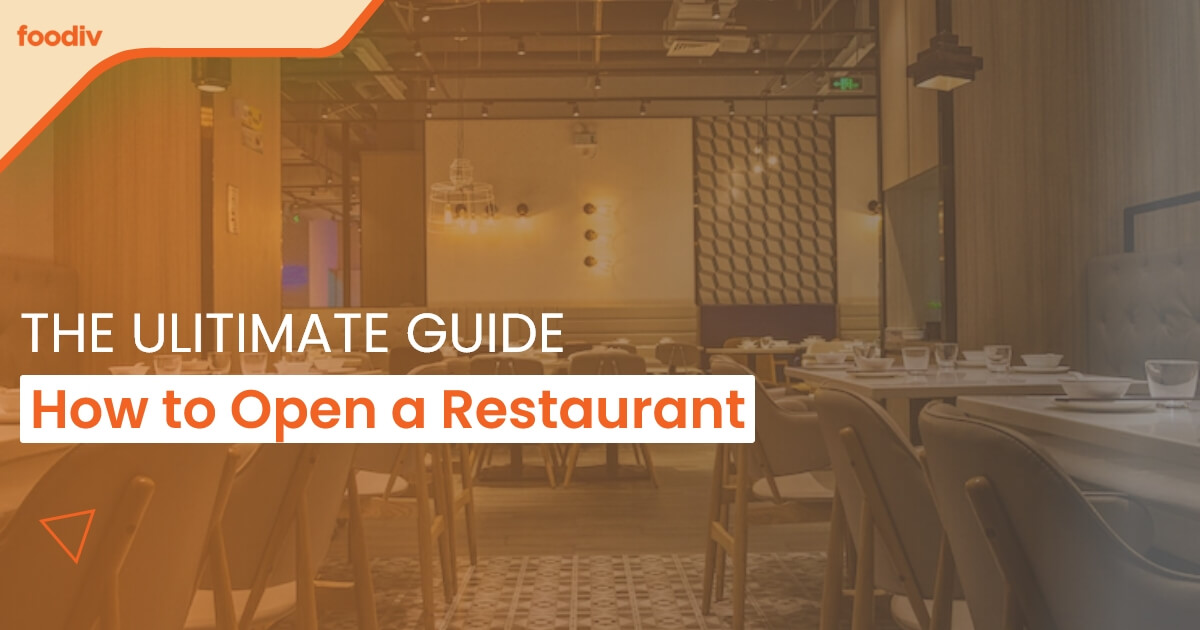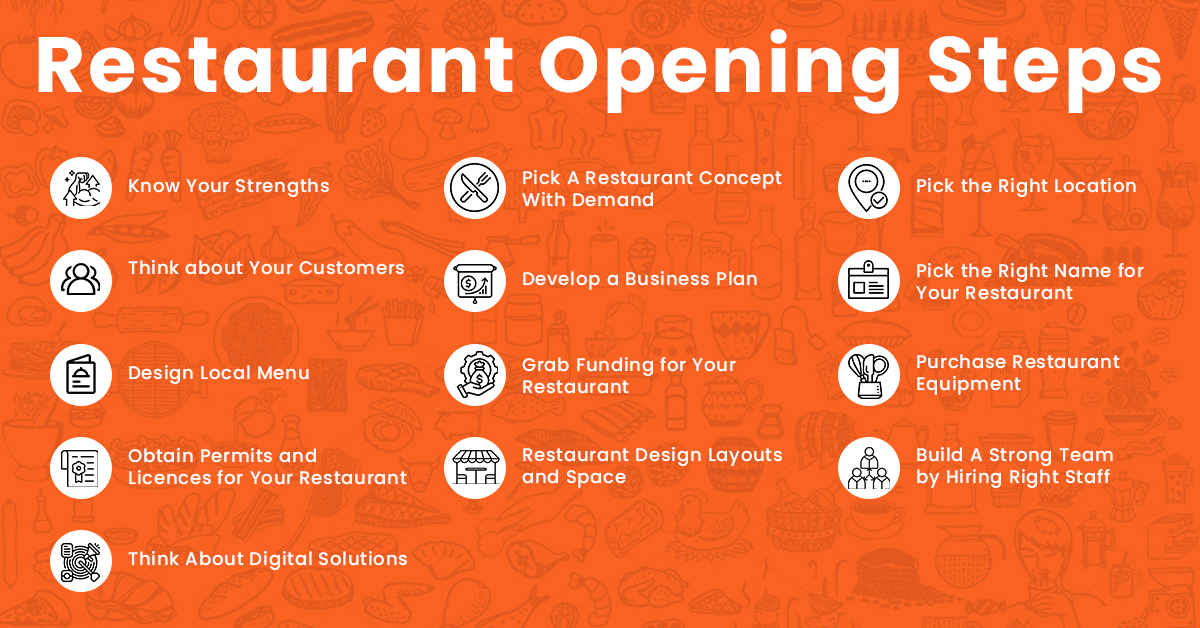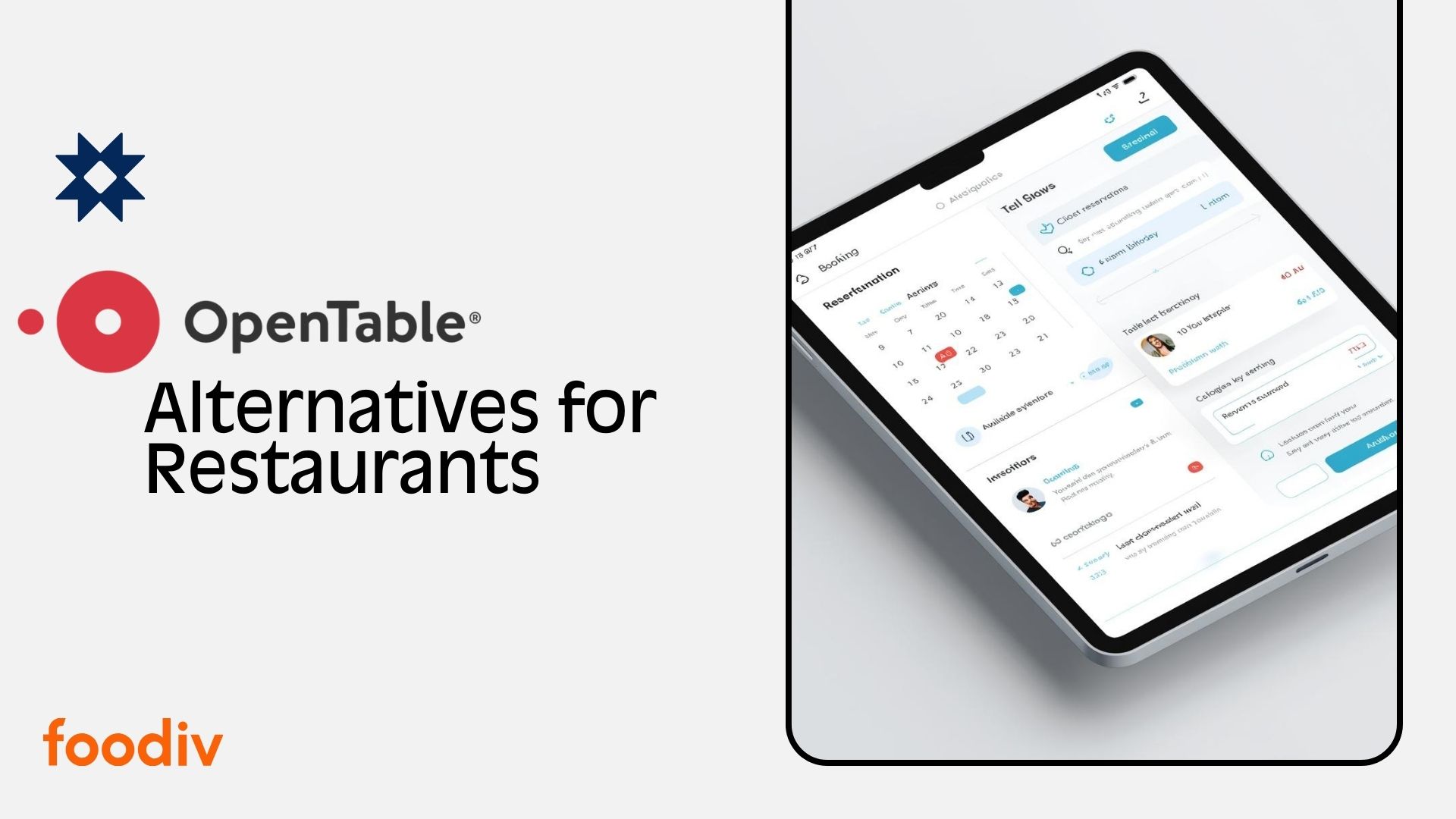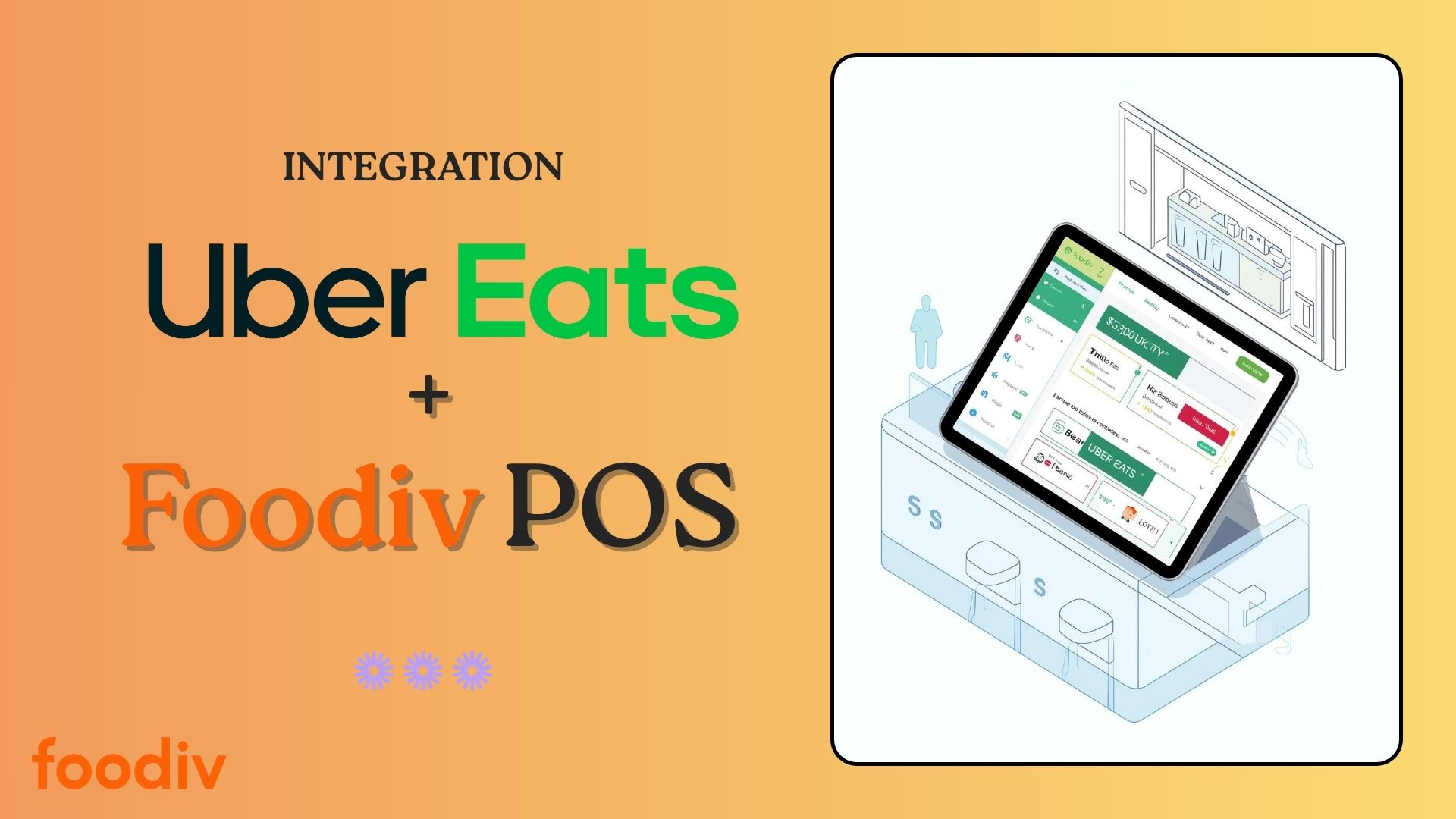
Quick Summary: Want to open a restaurant? Or, Are you looking to start a restaurant with NO experience? You must have researched the term ‘how to open a restaurant, still, you need the right suggestion. If that is the thing, you have landed at the right place. Here is how to start your own food business: a step by step guide to help you. Let’s explore;
Do you know that 62% of Gen Z love dining out once in a week? Plus, The sales in the food service industry reached $937 billion in 2022. If you’re thinking of starting a restaurant business for people to dine in, you’re on the right track!
But before you welcome guests, there’s a lot to figure out. Starting a restaurant is exciting and challenging at the same time. It’s about serving your customers with delicious food and delighting experiences for people. Read this blog to learn the ABC of how to open a restaurant business. The blog covers detailed steps to opening a restaurant business from scratch.
How to Opening a Restaurant: A Step-By-Step Guide

“How to start a restaurant business” Nothing can fully prepare you for opening your first restaurant, regardless of your educational background or level of experience. Furthermore, no matter how much you read or study, some aspects of opening a restaurant are something you can only learn from experience.
However, these steps for opening a restaurant below will help make the right decision and avoid some of the most typical errors.
Step 1: Know Your Strengths
Before you start anything else, the first thing you need to know is your strengths and weaknesses. You can know this by initiating a SWOT analysis. The SWOT analysis refers to Strengths, Weaknesses, Opportunities, and Threats.
Why You Need to Know Your Strength
How great it would be if you were to go into your restaurant, have your staff take care of all the customers for you, and you are just there to ensure everything is nice and tidy. More importantly, you make good money out of the restaurant business, and that is the goal and the ideal company you want to start. So, you can make all your dreams come true by knowing your strength. You need to know your power so you can double down on everything, from hiring people and buying kitchen equipment to marketing your restaurant business and cooking good food.
Similarly, you need to know your weaknesses so that you can know which area of your business needs more focus. For example, if you are not that good at managing people, you can hire a good manager who does this job for you. Same thing you can do for other things, such as hiring good chefs, buying equipment, creating the menu, and others.
Step 2: Pick A Restaurant Concept With Demand
If you have wanted to create your own restaurant, you must have given your restaurant concept a lot of thought. The exciting phase of opening a successful restaurant is to have an idea and turn it into the right shape, applying all your creativity, skills, and experiences. Your concept should outline the kind of eatery you intend to create, the type of food you’ll serve, and the kind of customer service you’ll provide. Your restaurant’s interior design should complement your concept.
Besides, you need to explore what people in the city are actually always ordering. You can know their eating habits with a bit of research. Say, for example, people in the USA love Pizza, but in some cities, they don’t. In some cities, people like to eat healthy food instead of taking food from the restaurant. That means you need to come up with healthy recipes. For example, consider starting a meal prep business.
Step 3: Pick the Right Location
It’s crucial to choose the ideal location for your business. You’ll need to conduct research on the local market, competitors, and demographics, as well as on the size, visibility, and history of the actual restaurant space. You might also choose to run a ghost kitchen to travel without a destination.
What to Consider while Selecting a Location for Restaurant?
When deciding on a physical location for your restaurant, you have two options: buy or rent restaurant space or build your own. Here are some additional factors to consider when determining whether a restaurant location is ideal for you:
- Target audience and desired clientele
- Real estate condition
- Community/Locality
- Site’s dimensions
- Former tenants
Step 4: Think about Your Customers
Your customers are the most crucial aspect of your business, no matter what sector you operate in or what products and services you offer. There are no sales without the customer. They, therefore, play a crucial role in creating your restaurant’s marketing strategy and messaging.
Why You Need To Know Your Customers
Because when you know your customers, you can come up with the foods that your customers in the regions prefer. Understanding customers means knowing their needs, food interests, and how frequently they use restaurant food. In short, in order to run your restaurant effectively, you need to understand your customers and their food interests.
Step 5: Develop a Business Plan
You will need a thorough, well-written business plan to open your ideal restaurant. Your business plan is a blueprint that explains the whole concept of your new venture. It describes in great detail how the new company will develop and function once its doors are open.
Why You Need A Restaurant Business Plan
You can establish and run your firm with the help of a solid restaurant business plan. You’ll use your business plan as a road map to build, manage, and expand your new initiative. It is a means to plan out and describe all the essential aspects of how your company will function, how much funding you need and what will be the outcome.
What Elements Should be Added to a Business Plan?
Your restaurant business should include the following elements;
- Executive Summary
- Company Description
- Market Analysis
- Organization and Management
- Concept and Menu
- Employees and Staffing Needs
- Marketing and Competitor Analysis
- Business model and service model
- Operations plan
- Financial analysis
- Summary
We have given you a rough idea of developing a restaurant business plan, though you can refer to restaurant business plan templates to understand what elements to be added.
Step 6: Pick the Right Name for Your Restaurant
Name is essential, and you need to think of a unique name for your restaurant. It must be unique, easy to remember, and relevant to your restaurant business.
Why Need to Choose the Right Name for Your Restaurant?
The name of a restaurant plays a crucial role in restaurant marketing strategy and instantly conveys to customers what kind of experience they can anticipate. Besides, getting a name for your restaurant is vital as it will not just let people know your restaurant by name but also create a brand identity.
Step 7: Design Local Menu
The next inventive stage in starting your restaurant is developing your menu. For any foodie, selecting the menu items to highlight should be fun, but proceed cautiously. Your menu will determine the kitchen equipment required, the qualities you should search for in a staff member, and the demographic you want to draw.
For example, if you are starting your restaurant near colleges, the menu should be geared toward college-age patrons. Similarly, you can think about customers and food menus based on the type of customers you get and the civilization.
The menu must also be created in a way that encourages people to make larger purchases. You should choose the cuisine you wish to provide and the menu items based on the customers’ preferences.
Step 8: Grab Funding for Your Restaurant
Getting money is the next step necessary to launch your new restaurant. Most of us lack the financial resources required to operate a restaurant on our own without help. Your ability to realize your dream of owning a restaurant will depend on your ability to obtain finance from outside sources. Your business plan will play a major role in pursuit of obtaining fundings. You can think about the following sources for funding;
- Traditional Commercial Loans
- Business Line of Credit
- Small Business Loan
- Investors/Angel Investors
- Crowdfunding
Step 9: Lease or Buy a Commercial Space
Have you decided on the location? Yes, then you need to lease a commercial space. Next, you need to focus on the following aspects when renting a real estate property.
First, the visibility and accessibility that receives a good number of commuters, foot traffic, and vehicles.
Second, the demographic —so the customer persona you created meets the specific region’s demographic.
Third, the labor cost —labor differs depending on the location you choose. Fourth, the competition —you need to choose a location where similar restaurants thrive, and owners make good money.
Step 10: Purchase Restaurant Equipment
After finalising a commercial space for your restaurant, the next thing is to purchase restaurant and kitchen equipment. You must buy or rent ovens, fridges, mixers, fryers, and kitchen utensils. Ensure to have all the items from the restaurant equipment checklist to be ready to fulfil all orders.
Step 11: Obtain Permits and Licences for Your Restaurant
You will require a number of federal, state, and municipal permits and licenses in order to open a new restaurant. Take legal counsel to ensure you take every step when applying for restaurant permits. Some of the most necessary licenses needed are listed below:
- Food licenses
- Health department permits
- Disabilities Act compliance
- Restaurant insurance
- Property insurance
- General insurance
- Liquor liability
- Auto liability
- Life insurance
- Fire insurance
- Loss of business
- Food contamination
Step 12: Restaurant Design Layouts and Space
You can choose the interior design depending on your restaurant’s concept, theme, and budget. There are two crucial elements of restaurant design —interior and exterior. You can take the help of an expert to help you create stunning restaurant designs. Here are a few things you need to remember while interior design.
- Seating capacity
- Furniture in the dining room
- Decor and ambiance
- Food preparation
- Cooking space
- Ware washing space
- Service
Step 13: Build A Strong Team by Hiring Right Staff
Hiring the right employees not just boosts your revenue but also helps in customer retention. Since they are on the front lines ensuring food quality and customer satisfaction, valuable personnel are crucial. Consider your crew as your restaurant’s motor, driving it forward and bringing you closer to your objectives.
Step 14: Think About Digital Solutions
When opening a new restaurant, it’s essential to promote your business. And, for promotion, you need an appropriate channel. Here are some suggestions for promoting your restaurant:
Build a Restaurant Website: A website becomes the backbone of your business. A good website with easy navigation and elegant design will attract customers and represent your restaurant as a brand.
Create Social Media Profiles: Do you want free yet effective promotion for your restaurant? Create social media profiles across Facebook, Instagram, and Twitter. You can use these channels to promote your restaurant business by uploading food-related content such as photos, videos, offers, and more.
Integrate Online Food Ordering and Menu System: If you have a vision and want to take your restaurant business to the next level, you need to integrate a digital solution. For example, you need to implement an online food ordering system. You can find plenty of vendors, like us, who deliver off-the-shelf, aka SaaS based, ordering software for the restaurant. With the software, you can easily manage your restaurant, offer a QR code menu to customers, and generate insights.
You May Also like to Read
Secret To Building A Profitable Restaurant
You need to adapt restaurant good practices to make a profitable restaurant. For example, the elements of making your restaurant business promising include;
- Reduce Food Costs
- Reduce overhead
- Train your staff how to upsell
- Utilize a Good POS
- Effectively Manage reordering and inventory
You need to plan, take expert advice and focus on how to increase restaurant sales. You may need good marketing strategies or maybe you need robust digital solutions, such as a POS system, QR code menu, a food delivery app, and more in this regard.
How much does it cost to open a restaurant?
It depends. Yes, the cost of starting a restaurant business depends on factors such as;
- The size of the restaurant
- Type of the restaurant
- Number of staff
- Restaurant Real Estate
The cost will vary depending on the factors we have suggested above. For example, a Restaurant Owner survey stated that you may need approximately $175,500 money to open a restaurant for a small restaurant. In comparison, medium and large-sized restaurants may cost $375,500 and $750,500, respectively.
Conclusion
Starting a restaurant business from scratch is a huge responsibility. We hope the above steps to start a restaurant will make your journey easier.
A successful start and maintenance demands proper planning. So, while opening a restaurant business, ensure you have a plan that aligns well with your long-term business goals and current market demands. You need a thorough understanding of the restaurant industry with the skills to promote your brand.
Besides proper planning and market research, the cost to build a food delivery app is a major concern among restaurant owners. Building an online restaurant app is hugely profitable for your brand promotion, wider audience reach, and sales growth. However, getting a tailored restaurant app demands a large upfront investment.
Want to start your restaurant business without breaking the bank? We have the way out.
Try Foodiv, a SaaS-based online restaurant ordering system with pre-designed features to help you kickstart your restaurant business within a few hours. The restaurant online ordering system seamlessly integrates with your restaurant solutions while offering all advanced features to delight your customers. So, start your restaurant business today with zero upfront cost with Foodiv.












